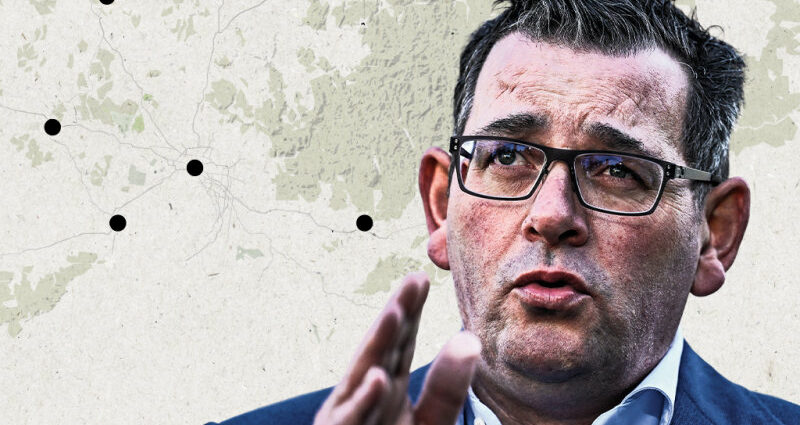Save articles for later
Add articles to your saved list and come back to them any time.
When the government confirmed with some glee that it had secured the Commonwealth Games in April last year it was spruiked as a benefit-cost no-brainer.
The 12-day event, we were told, would contribute more than $3 billion to the state’s economy, but would cost just $2.6 billion. The deal would both cement Victoria’s position as Australia’s sporting capital and would be a major boon for the regions. A win-win.
Even at the time it looked crazy brave. Not only was the timeframe pretty tight – the government had given itself just four years to prepare for one of the world’s largest sporting events – but there was nothing normal about the proposed model for hosting it.
Instead of making use of Melbourne’s many existing world-class sporting venues, accommodation options and public transport system, the Games’ events would be scattered across regional Victoria.
Showcasing the regions was a lovely idea.
But it also an alarmingly inefficient concept, considering the complexity of running dozens of events across 16 sports categories and accommodating and transporting tens of thousands of athletes and spectators over a geographically large area lacking sufficient infrastructure.
In the months following the announcement, regional councils unveiled extensive wish lists of infrastructure they said would be needed to host events and accommodate huge spectator crowds, from new train stations and athletes’ villages, to major stadium upgrades.
All the while, building costs had been rising at an alarming rate as the cost of raw materials soared following Russia’s invasion of Ukraine.
As the months ticked by, concerns about the state’s ability to deliver the games were compounded by warnings of skills and housing shortages – particularly in Victoria’s regions.
Shortly after the Government announced the games, the May 3, 2022 budget set aside a total of $2.6 billion, providing funding among other things for four separate athlete hubs in Geelong, Bendigo, Ballarat and Gippsland.
In 14 months since, the estimated cost has risen 169 per cent. Even after factoring in stronger than anticipated inflation over that period and rising building costs, this is an extraordinary blowout by any measure.
There are two related possibilities. The first is that the government failed to do its homework when it first undertook an assessment of the costs. Not only was it wrong: it was badly wrong.
The second, more intriguing, possibility, is that the budget blowout has given the government political cover to scrap the Games, perhaps having realised the state’s finances could not cope, or it would be unable to meet the timetable.
These possibilities are not mutually exclusive, with a combination of explanations likely for the decision.
Victoria’s housing crisis would also have figured in the government’s thinking.
There is little doubt the state’s senior economic bureaucrats have pointed out that building accommodation and stadiums over a relatively short timeframe would have soaked up the workers, materials and finance needed to deliver houses. Yet housing is now a priority for the government, with a major package of reforms in the pipeline.
What is clear is that since the Games were announced 15 months ago, fixing the state’s battered finances has become a political priority, as we saw in this year’s budget with the government’s debt repayment plan. The Games appear to be a casualty.
Victoria now has almost no financial wriggle room, with net debt set to reach $171.4 billion by mid-2027, producing an annual interest bill of about $8 billion.
On Monday, ratings agency S&P Global said while Victoria’s financial outlook is improving, it “remains very weak compared with other Australian states”.
The government has also been less than transparent about this disaster.
The Commonwealth Games Federation revealed in a damning statement that the cost figures used by the government to justify axing the Games were 50 per cent greater than the figure it provided to them just weeks ago.
The Federation said the government had blamed “price escalation primarily due to the unique regional delivery model that Victoria chose for these Games, and in particular relate to village and venue builds and transport infrastructure”.
Even factoring in the major international embarrassment, the government has probably made the right financial decision to cancel the Games.
But surely – surely – it should have, and could have, seen this coming a long time ago, before leaping headlong into what has become a major event mess.
Get the day’s breaking news, entertainment ideas and a long read to enjoy. Sign up to receive our Evening Edition newsletter here.
Most Viewed in National
From our partners
Source: Read Full Article
-
Billionaire heiress Eliza Fletcher found dead after violent kidnapping
-
PHOTOS: Easter Sunday services at Zion Baptist Church in Denver
-
Pictured: Tree surgeon who dumped a ton of trimmings on woman's lawn
-
UK 'in danger of becoming a two nation' state after Covid lockdowns'
-
Evil Wayne Couzens has desperate life sentence review rejected

